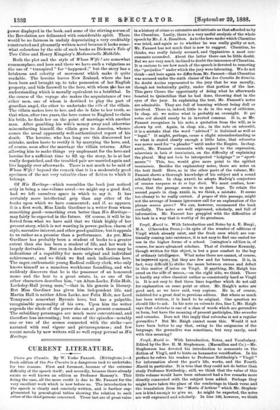CURRENT LITERATURE.
Cicero pro Cluentio. By W. Yorke Fausset. (Rivingtons.)—A fresh edition of the Pro Cluentio is a dangerous task to undertake, for two reasons. First and foremost, because of the extreme difficulty of the speech itself ; and secondly, because there already -exists so well known an edition as Professor Ramsay's. This being the case, all the more credit is due to Mr. Fausset for the .very excellent work which is now before us. The introduction to .the speech is clearly and concisely written, and is further sup- plemented by genealogical tables showing the relation to each .other of the chief persons concerned. These last are of great value in a history of crime so extensive and intricate as that afforded us by the Cluentius. Lastly, there is a very useful analysis of the whole speech by Mr. J. A. Hamilton. As to the laws under which Cluentius was tried, and again as to whether he was really guilty or not, Mr. Fausset has not much that is new to suggest. Cluentius, he thinks, was really falsely accused, and Oppianicus a most con- summate scoundrel. About the latter there can be little doubt. But we are very much inclined to doubt the innocence of Cluentius. It is curious to see how much of the speech is devoted to removing the "prejudice " under which the jury were labouring. We do not think—and here again we differ from Mr. Fausset—that Cluentius was accused under the sixth clause of the Lex Cornelia De Sicariis. No doubt Amine represented to the jury that he was morally, though not technically guilty, under that portion of the law. This gave Cicero the opportunity of doing what he afterwards boasted to Quinctilian that he had done, throwing dust in .the eyes of the jury. In explaining the text, Mr. Fausset's notes are admirable. They are full of learning without being dull or involved. There is, indeed, little to do in the way of criticism. In chap. xii. we notice what is probably an oversight. Si qui natus erit should surely be in inverted commas. It is, as Mr. Fausset recognises in his note, a quotation from the will, as is shown by erit. Again, in chap. xix., in the note on advocabit, it is a mistake that the word " advised " is italicised as well as " legal." It might, perhaps, cause a slight misunderstanding as to what is stated clearly enough a little later, that advocatus was never used for "a pleader" until under the Empire. In chap. xxvii., Mr. Fausset comments with regard to the expression, miserrimis in loci, et inanissimis, on the difficulty of explaining the plural. May not locis be interpreted "lodgings" or "apart- ments "? This, too, would give more point to the epithet inanissimis. Besides the explanatory notes, there are notes on the text itself. Here, as in the other parts of the volume, Mr. Fausset shows a thorough knowledge of his subject and a sound scholarly taste. In chap. xxxvii. he adopts Madvig's conjecture of eausam nusguam ea de re lege dixit. We must confess, how- ever, that the passage seems to us past hope. To retain the second poputo in chap. xxxiii. is, we think, a mistake. It seems too clumsy to be really correct. A propos of this passage, might not the average of human ignorance call for an explanation of the phrase morem gerere i* We can, however, recommend the book cordially. The notes are well expressed, scholarly, and full of information. Mr. Fausset has grappled with the difficulties of his task in a way that is worthy of its greatness.






































 Previous page
Previous page